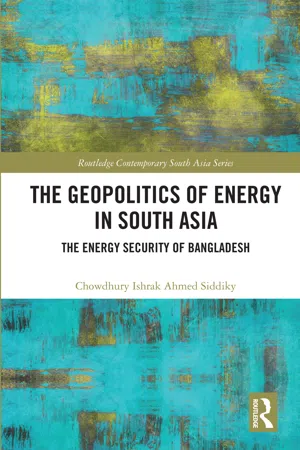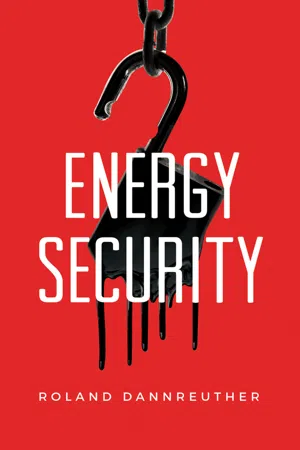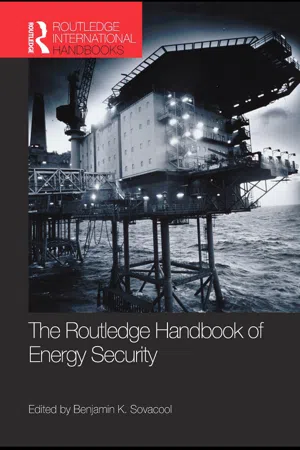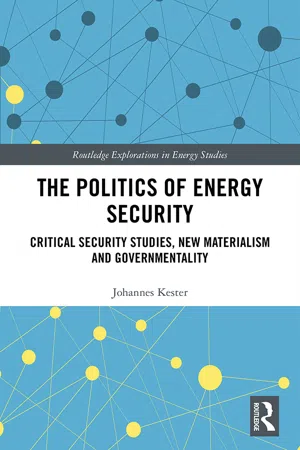Energy Security
Energy security refers to the reliable and affordable supply of energy resources, such as oil, natural gas, and electricity, to meet the needs of a country or region. It encompasses measures to ensure stable energy supplies, reduce dependence on foreign sources, and mitigate the impact of disruptions in energy markets. Energy security is a critical concern for national and global economic stability and geopolitical relations.
8 Key excerpts on "Energy Security"
- eBook - ePub
The Geopolitics of Energy in South Asia
Energy Security of Bangladesh
- Chowdhury Ishrak Ahmed Siddiky(Author)
- 2021(Publication Date)
- Routledge(Publisher)
...For example, Russia, Iran and Qatar collectively contain more than 50% of the world’s proven gas reserves. 98 Moreover, Gas Exporting Countries Forum (GECF) formed in 2001 controls about 70% of proven gas reserves. 99 Criteria for measuring Energy Security According to the Energy Security and sustainable development (ESSD) framework, Energy Security can be analyzed through the four A’s. 100 These four A’s are availability, accessibility, affordability and acceptability. 101 The four A’s focus on physical terms and both short-term and long-term objectives. Each of the four A’s is analyzed through pairing them with social, economic or environmental aspects. As a result, in order to analyze the Energy Security in South Asia, four criteria will be used to understand the current Energy Security scenario in the region. These four criteria are i) availability of resources, 102 ii) accessibility of resources, 103 iii) affordability of resources 104 and iv) the geopolitics of resources. Availability of resources The availability of resources concerns the delivery of the resource to the consumers. The delivery of the resource to the consumers can be implemented through ensuring that there is no supply disruption. In order to lower the supply disruption, diversification is important to ensure that a country is not dependent on one particular exporter for its supply. This would allow the country to become more flexible because it would result in multiple types of energy or various sources of supply. 105 The availability of resources also has an impact on the society in general. If a country cannot provide adequate resources to its citizens, it will cause unrest. Moreover, some countries provide energy subsidies to their people and as a result increase in the price of oil affects the subsidy requirement and can cause burden on the state. 106 The energy diversification of resources allows countries to ensure a steady supply of resources to meet their domestic needs...
- eBook - ePub
Traditions and Trends in Global Environmental Politics
International Relations and the Earth
- Olaf Corry, Hayley Stevenson, Olaf Corry, Hayley Stevenson(Authors)
- 2017(Publication Date)
- Routledge(Publisher)
...Indeed, the more that the term ‘Energy Security’ is invoked, the less clear it is just what is being ‘secured’. (Hildyard et al. 2012: 5) Comparable gaps in current Energy Security policies are noted by Wirth et al., who also note ‘the danger to political and economic security posed by the world’s dependence on oil’ (2003: 133). Lastly, Sovacool et al. (2014) look at energy equality and justice, making an important normative argument about access to energy and developing principles of energy justice. A somewhat separate set of normative arguments is raised by critiques of the continued focus on fossil fuels as problematic specifically because of their impact on the climate. Political geographers and scholars of environmental policy have been particularly significant in developing this important line of critique. Bradshaw argues that the mainstream literature on energy geopolitics ‘still fails to engage with the potential consequences of climate change’ (2010: 281). Environmental sustainability remains separated from concerns over security of supply (Kruyt et al. 2009; Umbach 2012). Bradshaw (2010: 287) emphasises globalisation and the need to address Energy Security concerns above the state level, arguing that Energy Security and climate change are global problems that cannot be solved by a single state or region. Framing energy as a state security issue serves to separate it from environmental concerns more generally, and as a result it remains prioritised above environmental concerns (Nyman 2016, 2017). Meanwhile, if we consider environmental security, it becomes clear that Energy Security ‘also concerns the ecological impact of burning fossil fuels’: following this, the solution is not maximising fossil fuel supply, but rather renewable energy or great reduction in energy use (Barnett 2001: 35; Vanderheiden 2011)...
- eBook - ePub
- Roland Dannreuther(Author)
- 2017(Publication Date)
- Polity(Publisher)
...2 Energy Security: An Analytical and Theoretical Framework One of the immediate problems with Energy Security is defining the meaning and the scope of the concept. It is a frequently stated truism that Energy Security is a multi-dimensional phenomenon (Baumann 2008; Chester 2010). The challenge is to identify and then classify or categorize these different dimensions. A leading handbook on Energy Security illustrates the extent of the challenge as it identifies the following nine dimensions: climate change, sustainable development, maritime, public policy, diversification, environmental, energy poverty, social development, energy services and industrial (Sovacool 2011). This reflects, as the editor notes, the different ways of approaching Energy Security and whether one adopts a scientific, economic, ecological, social welfare or geopolitical perspective (see also Sovacool 2016). Energy Security can also be seen to have a temporal dimension, with differing analyses as to whether the perceived risks or threats are short-term or long-term in nature. There is also a question of scale and whether Energy Security is being examined at a global level or at a local level or at a level somewhere in-between. Even at the basic level of a clear definition of Energy Security, there are a multiplicity of competing definitions and no universally accepted core definition. One common attempt to bring some degree of order to the complex multi-dimensional nature of Energy Security is to isolate four key elements within the concept. There is some variation in the descriptors for these four elements with, for example, Jonathan Elkind promoting a widely used categorization of availability, reliability, affordability and sustainability (Elkind 2010), while others have adopted similar terms such as availability, accessibility, affordability and acceptability (Bridge and Le Billon 2013: 93–124)...
- eBook - ePub
- Benjamin K. Sovacool, Benjamin K. Sovacool(Authors)
- 2010(Publication Date)
- Routledge(Publisher)
...4 THE SUSTAINABLE DEVELOPMENT DIMENSION OF Energy Security Asclepias R. S. Indriyanto, Dwi Ari Fauzi, and Alfa Firdaus Introduction The world’s historic reliance on oil has influenced many aspects of human life, from political platforms and economic policies to business practices and the daily energy decisions of individuals. The world is now facing manifold energy-related challenges from many directions and in various forms, as our fondness for oil and other fossil fuels has been identified as a significant contributor to global warming. This chapter highlights three wide-ranging principles, namely Energy Security, sustainable development, and governance, that can help us see through the complexities of the energy challenges we are facing. As many other chapters in this book reveal, perspectives on Energy Security evolve through time. Energy Security concerns were initially centered on the availability of energy, and the center of attention was on the primary energy supply side, especially crude oil. However, in recent years it has been widely recognized that energy availability can be affected by various factors in each segment of the energy industry, as well as in interactions among those segments. Major concerns remain in relation to the sufficiency of supply and the quality of energy services. However, prices and various economic arrangements are also important since they dictate the quantity and quality of energy provision, as well as the pattern of energy consumption. Further, activities in all segments of the energy sector impact society, ecology, and the environment in general, which in turn directly or indirectly affect the supply and demand of energy and therefore Energy Security as well...
- eBook - ePub
The Politics of Energy Security
Critical Security Studies, New Materialism and Governmentality
- Johannes Kester(Author)
- 2018(Publication Date)
- Routledge(Publisher)
...Reynolds describes how Canada’s oil reserves increased from six to almost 174 billion barrels after the political decision to (1) stretch the concept of crude oil to include oil sands bitumen and (2) to decree these oil sands as proven reserves instead of ‘remaining established’ reserves without physical, technical or economic foundation. 27 In other words, Chester’s absolute dimensions of availability and capacity are not as absolute as they seem and are effectively subject to a politics of ontology as well (for more, see Chapter 5). 3.3 Theories of Energy Security An alternative to analysing the contents of Energy Security through categorization is a theoretical reflection on Energy Security. While a range of theories and disciplines are applicable to energy and offer their own priorities for Energy Security, 28 like political ecology and its environmental focus, Energy Security itself, as a field and concept, is primarily discussed by theories that are borrowed from IR and IPE. These include (neo)realist geopolitics with its focus on conflict, neo-liberals focusing on markets and institutions, and more critical theories that study energy as part of a particular economic order. 29 As the latter literature is only marginally used for Energy Security itself, Aalto et al. are right in claiming that the field of Energy Security lacks theoretical ambition. 30 First, a neorealist-inspired geopolitics is the study of how geographic factors interact with international relations. It has a long history, but the demand from Asia and the 2008 oil price shock reinvigorated this approach for Energy Security from 2006 onwards. 31 The geopolitics practised within energy however has less to do with the theory of geopolitics and more with the politics of geographically dispersed natural resources...
- eBook - ePub
Non-Traditional Security Challenges in Asia
Approaches and Responses
- Shebonti Ray Dadwal, Uttam Kumar Sinha, ShebontiRay Dadwal(Authors)
- 2017(Publication Date)
- Routledge India(Publisher)
...It explores the geoeconomic and geopolitical dimensions of India’s Energy Security centering on the trans-Asian energy axis. The first section of the chapter provides a brief theoretical construct about Energy Security from the perspective of India as a major energy importer concerned with supply security and the Gulf region as a major exporter looking for demand security. Positioning India and the Gulf region in the current global energy regime, the second section describes the fundamental dynamics of India’s Energy Security and the role of the Gulf region. The third section carries forward the analysis to check the implications for India from the perspective of the trans-Asian energy axis. Given the fact that India’s dependence on Gulf is set to increase manifold and India is becoming a niche export destination for Gulf energy, the last section explores how this energy interdependence could be strengthened in the future and develops few policy suggestions. Energy Security: Theoretical Construct From the 1970’s Oil Crisis to the contemporary debate on climate change, the concept of Energy Security has evolved into different perspectives and narratives. The concept of Energy Security is intrinsically intertwined with various manifestations of the International Relations (IR) Theory, which demonstrates mainly four different approaches 3 as mentioned in Table 14.1. The analysis in this chapter is based on the third “New Energy Economy” approach. The concept of Energy Security is premised on “energy interdependence” between India and the Gulf region which has benefits as well as costs from the perspective of supply security and demand security, respectively...
- Hongtu Zhao(Author)
- 2018(Publication Date)
- Academic Press(Publisher)
...Chapter Five Energy Security From Energy Independence to Energy Interdependence Abstract Energy Security is becoming increasingly globalized, so energy independence turns contrary to the international trend. The essence of American energy independence refers only to the fall of import ratio instead of independence in the real sense. The commodity attribute of energy is increasingly prominent, while its strategic attribute is obviously weakened. The energy problem exhibits a certain trend of “de-security,” and global energy governance will gradually become the mainstream of energy problems. The international community needs to strengthen the concept of interdependence, dialog, and cooperation, in order to jointly cope with risks and challenges. Keywords Energy Security; energy independence; energy interdependence; shale revolution; oil weapon; economic globalization; market integration Energy independence, enormously attractive and appealing, is the dream pursued by many countries. Inspired by the successful development of shale gas and tight oil, energy independence has once again become a hot topic in the United States and other countries in recent years. Under the influence of planned economy and self-reliance for many years, China has shown considerable anxiety for being a large energy importing country with the constant rising ratio of oil importing. To a large extent America is often admired as a country of energy independence. However, the essence of the current American energy independence refers only to the decline in import ratio, with energy independence difficult to achieve in the near term. With the deepening of globalization and energy interdependence, Energy Security has become more and more globalized. International Energy Security cooperation has also gradually expanded from some countries or groups to the whole world...
- eBook - ePub
The End of Oil
On the Edge of a Perilous New World
- Paul Roberts(Author)
- 2005(Publication Date)
- Mariner Books(Publisher)
...There is a void in security.” … Iraq is simply the latest reminder, if one were needed, that in a global economy dependent largely on a single fuel, “Energy Security” is a thin fiction. Since September 11, we’ve all become much more aware of the vulnerability of the sprawling energy infrastructure that moves oil, gas, and power around the planet. On TV talk shows and in magazines and newspapers, a parade of experts on terrorism and sabotage have described in gory detail the devastation that would be caused by a well-planned al-Quaeda-style attack on any of a dozen “choke points” in the energy order—the trans-Alaskan pipeline, for example, or the huge oil ports in Rotterdam, or worse, Ras Tanura, the massive Saudi export facility that handles six million barrels a day. Yet if Iraq’s oil problems show us anything, it is that the real threats to Energy Security go well beyond sabotage and dirty bombs. At its most basic level, “Energy Security” is our ability to meet immediate energy demand—that is, to produce adequate volumes of fuel and electricity at affordable prices and to move that energy to the countries that need it, when they need it, to keep their economies running and their people fed and their national borders defended. A failure of Energy Security means that the momentum of industrialization and modernity grinds to a halt, and survival itself becomes far less certain. Energy Security is where the rubber hits the road in global energy pol icy, the harsh reminder that crises like air pollution and energy colonialism and even climate change are by no means the most serious ones facing the energy economy. For if we can’t meet basic energy demand—demand that, under current trends, is growing so fast that it will double by 2035—none of these other things will matter. And Energy Security goes well beyond mere questions of supply...







